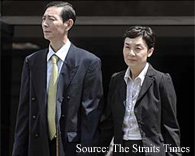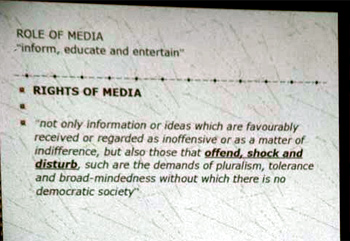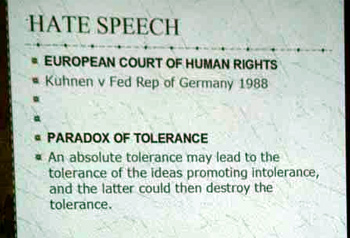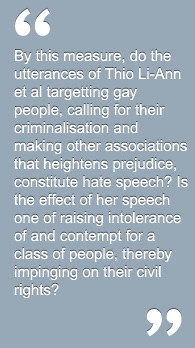
Ong Kian Cheong and his wife Dorothy Chan were convicted under the Sedition Act and sentenced to eight weeks' jail.
Ong Kian Cheong, 50, and his wife Dorothy Chan, 46, will soon be starting their eight weeks' jail term. They were convicted under the Sedition Act for mailing Chick Publications literature, specifically, the tracts The Little Bride and Who is Allah? to Muslim recipients.
The Little Bride is a cartoon strip that says a number of things, chief among which are that the Prophet Mohamed is a paedophile and that the Prophet's teachings are false. To read more about The Little Bride, click here.]
Chick Publications is a fundamentalist Christian outfit in the United States that publishes pamphlets, comic books, videos and similar material that denigrate other cultures and religions in its effort to recruit people into its form of evangelical Christianity. Even in the US, it is highly controversial and many mainstream Christians object to the way it goes about its mission.
Singapore's Sedition Act defines sedition in broad ways, going further than the original meaning of the word 'sedition', which is any act that incites rebellion against a government. The law defines "seditious tendency" thus:
Seditious tendency.
3. (1) A seditious tendency is a tendency
(a) to bring into hatred or contempt or to excite disaffection against the Government;
(b) to excite the citizens of Singapore or the residents in Singapore to attempt to procure in Singapore, the alteration, otherwise than by lawful means, of any matter as by law established;
(c) to bring into hatred or contempt or to excite disaffection against the administration of justice in Singapore;
(d) to raise discontent or disaffection amongst the citizens of Singapore or the residents in Singapore;
(e) to promote feelings of ill-will and hostility between different races or classes of the population of Singapore.
Ong and Chan were found guilty through the limb (e). By their actions, they were said to be causing offence to Muslims, thus creating ill-will between classes, undermining civil peace in society.
The intent of this law is similar to Sections 298 and 298A of the Penal Code.
Uttering words, etc., with deliberate intent to wound the religious or racial feelings of any person
298. Whoever, with deliberate intention of wounding the religious or racial feelings of any person, utters any word or makes any sound in the hearing of that person, or makes any gesture in the sight of that person, or places any object in the sight of that person, or causes any matter however represented to be seen or heard by that person, shall be punished with imprisonment for a term which may extend to 3 years, or with fine, or with both.
Promoting enmity between different groups on grounds of religion or race and doing acts prejudicial to maintenance of harmony
298A. Whoever
(a) by words, either spoken or written, or by signs or by visible representations or otherwise, knowingly promotes or attempts to promote, on grounds of religion or race, disharmony or feelings of enmity, hatred or ill-will between different religious or racial groups; or
(b) commits any act which he knows is prejudicial to the maintenance of harmony between different religious or racial groups and which disturbs or is likely to disturb the public tranquility,
shall be punished with imprisonment for a term which may extend to 3 years, or with fine, or with both.
The principle behind criminalising hate speech beyond a certain degree is sound. There is a larger public interest in not allowing anyone to deliberately provoke conflict between classes of people. Everybody suffers when civil peace breaks down.
The problem lies in both the wording of the laws and, arising from that, the way they may be implemented.
For example, the Sedition Act does not appear to require foreknowledge or intent to make the crime, and by any principle of justice, this seems improper. Section 298A is perhaps too narrow, restricting itself to race and religion. What about national origin, gender or sexual orientation?
Section 298 is the most problematic of all, in my view. It criminalises insult on a personal level, as opposed to group level. All it takes is for one person to say "You have wounded my feelings with respect to my racial or religious views" and hey presto, it's a crime.
The first issue I have with 298 is that the offence is outsourced to the subjective views of the listener. He himself could have kooky, unscientific, irrational views, e.g. that his race is superior to all others, his god is superior to all others, or that according to his religion, females should be subordinate to males and female genital mutilation is part of his covenant with his god. So long as he can claim that they are part of his racial or religious identity, is everybody else supposed to shut up?
The second issue I have is related. Does this not pull the rug out from under others' freedom of speech? This freedom is a critical asset to any society. It is the means by which a society reflects upon its habits and norms and cures itself of misguided beliefs, practices and injustice. The right to offend by speaking against prevailing ideas, whether held by few or many, is essential to the proper working of this freedom.
A slide put up by lawyer George Hwang at a recent forum on censorship - the event was part of Indignation, People Like Us' Gay/lesbian Pride season - puts it succinctly: The freedom to offend, shock and disturb is fundamental to pluralism, tolerance and broadmindedness without which there is no democratic society.

Singapore, by contrast, takes the opposite view. While agreeing that pluralism, tolerance and broadmindedness are our objectives as a society, the route there is via censorship and the suppression and criminalisation of offensive speech. Enforced politeness is preferred over airing and learning.
Considering that we've made virtually no progress in the last 40 years in terms of privately-held racist views, and the increasing religious ghettoisation of our society, how can we say that such a policy works?
Is this tension between the need for civil peace and freedom of speech impossible to reconcile? Must one be at the expense of the other? How can we define hate speech in a way that is still consistent with, or at least, less antagonistic to, freedom of speech?
Another slide put up by Hwang pointed a way forward.

Hwang did not discuss the details of the case Kuhnen v Federal Republic of Germany, though I'm sure a web search is all that is needed if anyone is interested. Basically, Michael Kuhnen was a neo-Nazi (he was also homosexual) who was arrested for his views and activities. The case went all the way up to the European Court of Human Rights which ruled on whether it was lawful for Germany to proscribe neo-Nazi speech.
Outlining a matter of principle, the Court said that a state may ban hate speech since "absolute tolerance may lead to the tolerance of the ideas promoting intolerance, and the latter could then destroy the tolerance."
By extension therefore, proscription of hate speech is justifiable when it is used to defend democracy and others' freedom of expression. That is to say, speech that seeks to vilify a class of people in order that that class will be widely treated with intolerance, contempt and prejudice can be banned because such speech will have the effect of curtailing the civil rights of the targetted class. The latter's right to be full citizens of society, with access to equal, peaceful, suspicion-free interaction with others, including access to jobs, housing, education, medical care and participation in civic life, their right to dialogue with other sections of society with their views given due hearing - all these coming under the rubric of tolerance - will be infringed if vilifying speech is allowed to make headway.

At first sight, the difference in emphasis appears slight, but it is crucial. By this formulation, hate speech is not the words and actions that hurt feelings. It is not to be equated with causing offence. Hate speech is such words and actions that seek to isolate and denigrate a class of people, such that the targetted class will suffer a loss of civil rights and civic participation, thus undermining freedom and democracy for all.
In the light of this, examine the conviction of Ong and Chan. While a case may be made that Chick Publications' material constituted hate speech in the way Muslims and Islam are portrayed, it is perhaps important to note that Ong and Chan mailed the material to Muslims, not to third parties. They were clearly out to provoke and offend Muslims, but did their actions constitute an attempt to cause third parties to treat Muslims with contempt? This I think is debatable. For this reason, I find this case troubling.
On the other hand, if one considers Chick Publications' material to constitute hate speech, then surely, the importation - Ong and Chan were said to have ordered the items online - would constitute distribution of hate speech. Does it make any sense to say the production of material is wrong, but not the distribution of it?
Indeed, this is a very difficult issue, so all the more, I think, it is important for Singaporeans to discuss it. What do we mean by the term "hate speech"? Where do we draw the line between tolerable offensive speech and legally intolerable hate speech? The Kuhnen decision offers a good starting point in my view and I hope the discussion takes note of it.
Alex Au has been a gay activist and social commentator for over 10 years and is the co-founder of People Like Us, Singapore. Alex is the author of the well-known Yawning Bread web site.











 列印版本
列印版本










讀者回應
http://www.catholic.com/library/sr_chick_tracts_p1.asp
You might also want to take a look at the hilarious anti-gay tract called "Gay Blade", but I think someone said the site is blocked in Singapore. Are there bookshops selling that in Singapore?
Being frank, the definition of seditious speech based on what is going on in Malaysia currently is simply whatever that is against popular or majority sentiments.
For example, in the case of RPK, his speech is viewed seditious because he basically accuses the current Malaysian Prime Minister of conspiring to murder Mongolian mediator Altantuya Sharibuu.
Similarly, when the Muhammed cartoons took to the front page of newspapers in Malaysia, it was deemed seditious. While a few papers lost their licenses, government linked media such as The New Straits Times were let off.
This shows obvious bias.
In another case, two journalists pretending to be Christians went into a church for an expose' on what goes on during mass, and took pictures and published images of both of them with communion wafers spat out unto their hands, yet were not charged with Sedition, as in the definition attached.
There is an obvious bias in the rule of law on what constitutes sedition, and I honestly think it would include gay hate speech should pressure be applied to do so.
The freedom of speech, while being a great tool to encourage intellectual discourse, is also mostly used to promote hate speech. The Sedition Act tries to stop such agendas from going forward without a penalty.
People in general have yet to evolve into a collective that would rather sit down and talk rather than simply barge in, protest, or murder someone. I think this was rather obvious when a nation as liberal as Netherlands had their last descendant of Van Gogh murdered due to a video clip he made.
Political expedience.....archaic/ambiguous laws at their free disposal...coupled with general public apathy on the issue of civil liberties as compared to economic prosperity...survival of the powers in charge...
How can we forget that often, 'freedom' of whatever is often defined by the political masters of the day. One can pull out all of the treaties, conventions and so forth...but do the political masters care? Ever heard of 'might is right'? Sounds corny eh? But guess what? It's the order of the day in most countries. Don't like it? Guess what again? Do they care?
The 'only' way out? The ballot box....the next general elections...as if that is immuned from getting rigged...but what can one do?
As someone once remarked to me, "It's not what you know that matters, it's who you know". And this my brethren, is not limited to working life, business or dating....it is even more spelt out in politics and the legal world, a 'reality' that is a way of life or 'business as usual' in many parts of this planet. It's the rice bowl issue that outweighs all other considerations, especially 'rights' when it comes to survival of the fittest for those in power.
But to be fair....
I have heard said once that if an individual or a group of people are not capable of self governance or censorship, perhaps then they needed to learn one lesson in that from the law? 'Dare to do the crime, dare to do the time' or in Malay: "Berani buat, Berani tanggung". Again, depends on who is the one who 'buat' isn't it? The 'who you know' thingy or better yet if you are amongst the 'who's who'.
Sigh.... Welcome to 'reality'....
Check out this piece of news about an anticipated news portal : SINGANEWS ; me likens this to wolf in sheeps clothing; spread the warning!
http://temasekreview.com/?p=13601
請先登入再使用此功能。